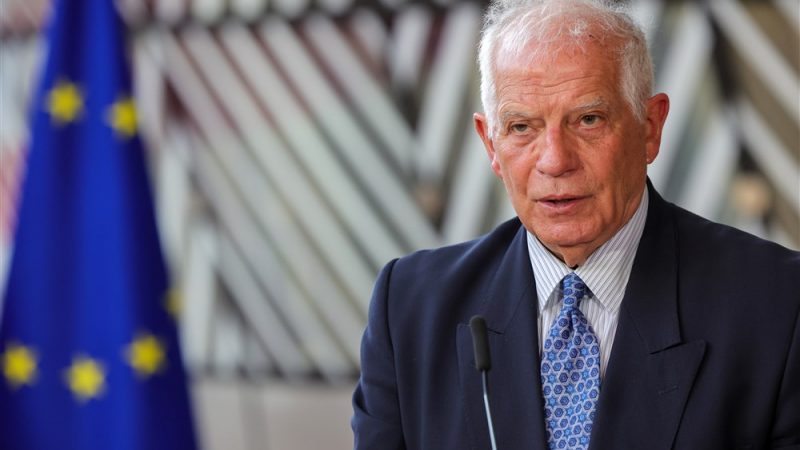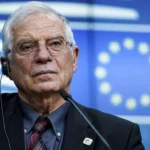Amid controversy over French President Emmanuel Macron’s trip to China, EU foreign policy chief Josep Borrell is expected to present a unified European front on China policy during his visit to China. the country at the weekend.
Borrell is expected to travel to Beijing from Thursday to Saturday (April 13-15) for the annual EU-China strategic dialogue with Chinese Foreign Minister Qin Gang.
He will also meet with China’s top diplomat, Wang Yi, on Thursday, as well as China’s new defense minister, Li Shangfu.
The head of European diplomacy is expected to reiterate the Union’s commitment to its own One China policy, while reaffirming the Union’s right to establish ties with Taiwan within the framework of this policy.
“It is essential to preserve peace, of course, especially in the Taiwan Strait, in and around Taiwan,” a senior EU official said ahead of Borrell’s trip.
“EU member [states] do not give military aid to Taiwan [like the US does]. That said, we are strongly engaged in and with Taiwan, which has a very strong economy and a very flourishing democracy,” added the senior EU official.
The issue has become one of the most controversial topics of the trip, particularly after Mr Macron’s comments cast doubt on the West’s commitment to the island.
During a flight from Beijing to Guangzhou last week, Mr. Macron told reporters that the EU should avoid becoming a “vassal” of the United States vis-à-vis China, and insisted in particular on the need to distance itself from any potential military aid to Taiwan.
“Do we have any interest in speeding up on the subject of Taiwan? No. The worst thing would be to think that we Europeans should follow suit on this subject and adapt to the American pace and an overreaction from China,” Macron said.
The remarks, which drew backlash from lawmakers in the United States and Europe, came a day after a state visit in which France deepened its economic and cultural ties with Beijing.
“Some Western leaders dream of cooperating with everyone, with Russia and with some powers in the Far East,” Polish Prime Minister Mateusz Morawiecki said before leaving for a state visit to the United States on Tuesday. (April 11).
EU Officials And Diplomats
Some EU officials and diplomats, however, fear that the initially planned low-key visit could turn into a tough interrogation if the Chinese decide to take advantage of the apparent divisions.
“We find that the Chinese are keen observers of every nuance emanating from Europe,” the senior EU official explained, alleviating concerns and adding that this would make Mr. Borrell’s mission “much more interesting”.
Mr Macron’s message also contrasted sharply with that of European Commission President Ursula von der Leyen, who joined him for a meeting with her Chinese counterpart Xi Jinping.
Prior to the trip, Ms Von der Leyen said it was not in Europe’s interest to dissociate itself from China entirely, but rather the EU should consider diplomatic and economic “risk reduction”. , an approach that has garnered broad support across the Union.
Mr Borrell, who represents the 27 EU member states, will need to synthesize these differences into a cohesive message.
“ The French President always speaks on behalf of the French Republic ”, argued a senior European official before Mr. Borrell’s visit, on condition of anonymity, in order to be able to express himself more freely.
“France is one of the 27 member states [of the EU]. If the German chancellor says something, does everyone say it’s EU policy?”
“The High Representative’s task is to represent the common views that all member states have reached,” he stressed, referring to the common lines on China that EU leaders adopted in October.
At the time, they also reaffirmed their support for the EU’s so-called “triptych” approach towards China, which consists in considering this country as a partner, a competitor and a rival at the same time.
Beyond the fallout from Mr Macron’s remarks, Mr Borrell is expected to again ask Beijing for China to be a “facilitator” of a potential peace in Ukraine and raise concerns about human rights and imbalances economic.
Although it seems unlikely that the European Union will be able to influence Beijing’s Ukraine policy, Mr Borrell said last month that the partnership between Beijing and Moscow had limits, despite official rhetoric and visits public statements that indicate otherwise.
Separately, the flurry of visits to Beijing comes as the date for the annual EU-China summit has yet to be set and the bloc has yet to receive an official invitation from Beijing, which is to host the event. later this year, according to EU sources.
This article is originally published on euractiv.fr









